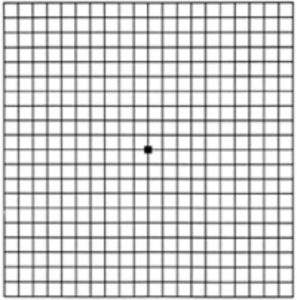Courtesy of Personalized Retina Care of Naples
Retinal diseases are silent: there is no pain, no redness, no tearing associated with them.
Until it affects the macula, the very central part of the retina, there are no symptoms.
Most of us only go to the Eye Doctor once a year, but what happens if you’ve experienced a visual disturbance? How would you Know? As with any disorder or disease, the earlier the diagnosis, the better the outcome with treatment. So it is of utmost importance essential to do self-checks throughout the year.
If a retinal disease affects one eye, the vision might get initially slightly blurry, but if you have both eyes opened, one eye ‘covers’ for the other and mild blurry vision can go unnoticed. With vision disturbance from retinal diseases, the vision stays blurry even with the appropriate pair of glasses. That is why if you are losing vision with your pair of glasses, you need to see an eye doctor right away.
Dr. Katia Taba, a Retina Specialist of Personalized Retina Care of Naples, recently spoke to a patient with a common symptom that many people overlook.
The patient explained to Dr. Taba about a recent visual disturbance, describing that upon waking up every morning, she noticed that their Venetian blinds were crooked and appeared wavy. And it went on for several days before she thought about covering one eye. When she did this, she noticed the visual disturbance was affecting only one eye.
Dr. Taba wants patients to know how important it is to check your vision regularly, one eye at a time. At-home testing can save your sight. It doesn’t replace seeing a specialist, but it helps you monitor what is happening to your vision in between those visits.
One of the simple ways of testing your vision at home is with an Amsler grid.

a day, every day:
1. Wearing any glasses you normally use to read,
hold the grid 12 to 15 inches away from your face
in good light.
2. Cover one eye.
3. Look directly at the center dot with your
uncovered eye and keep your eye focused on it.
4. While looking directly at the center dot, notice in
your side vision if all grid lines look straight or if
any lines or areas look blurry, wavy, dark or blank.
5. Follow the same steps with the other eye.
6. If you notice any areas of the grid that appear
darker, wavy, blank or blurry, contact your
ophthalmologist right away.
Remember: doing this simple at-home eye test once a day, every day can help save your vision. You can download a free Amsler grid by visiting our webpage: www.retinanaples.com
Macular Degeneration
The macula is the central area of the retina that provides the most intricate details of sight. It is an oval area that acquires images that travel through the cornea and lens and provides visual communication to the brain.
In adults over the age of 50, age-related macular degeneration (AMD) is the leading cause of blindness. It is estimated that more than 10 million Americans have some degree of AMD, and unfortunately, there is still no cure for the disease. But there is a great treatment for some forms of the disease.
In AMD, the macula becomes damaged leading to loss of vision, distortion or the appearance of blind spots in central vision. It can be brought on by both hereditary and environmental factors.
There are two main types of AMD, wet and dry. Typically, AMD starts as the dry type and may progress into the wet form of the disease. Dry macular degeneration is the most common form of the disorder, In some cases, whitish deposits (drusen) adhere to the retina, just under the macula and the drusen weaken and deteriorate the macula causing severe central vision loss and blindness.
Wet macular degeneration happens to about 10 to 20% of the individuals that have dry AMD and is usually caused by blood vessels that leak fluid or blood into the macula. It causes blind spots, blurry vision and rapidly escalates to vision loss.
Macular degeneration has several therapies that prevent the disease from progressing. One of the main treatments for wet macular degeneration is anti-VEGF (anti-vascular endothelial growth factor) injections.
Dr. Taba, Ophthalmologist and Retina Specialist explains, “In a National Eye Institute (NEI) study, researchers concluded that before the anti-VEGF injections, 2/3 of wet macular degeneration patients went legally blind within two years of diagnosis. Now, we are able to keep vision 20/40 or better in half of our patients. This reduction reflects on a 20% decrease in long term facilities admission since elderly patients are not going legally blind.”
The conclusion of the study confirmed that antiVEGF injections are a major long-term therapeutic advance for neovascular AMD and it was effective at decreasing blindness and the progression of the disease.
If you are experiencing any changes in your eye health, whether it is blurry vision, pain, impaired vision, or any other visual irregularities, it is imperative that you see an ophthalmologist right away. The earlier disease or disorders are detected, the better the outcome and treatment options are for you.
Personalized Retina Care of Naples provides incomparable diagnosis, medical and surgical treatment for retinal conditions and disorders. Dr. Taba is a Board-Certified Ophthalmologist and is Fellowship trained in surgical and medical retinal diseases.
There are ways to regain your independence and correct low vision. To find out more, or to schedule your appointment, please call (239) 325-3970 today.
Personalized Retina Care of Naples
www.retinanaples.com
239-325-3970
3467 Pine Ridge Rd., Suite 103, Naples 34109
Sources:
https://www.aao.org/eye-health/tips-prevention/facts-about-amsler-
grid-daily-vision-test
https://www.aao.org/editors-choice/5-year-catt-data-reveals-strengths-
limitation-of-a









